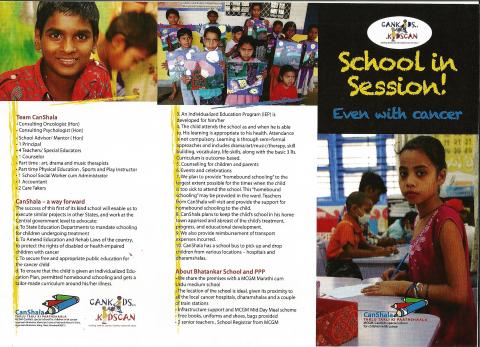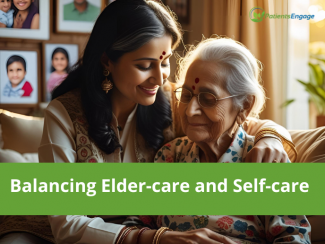
Children who are out of town patients often miss school for months on end. This affects the child socially and psychologically and often makes reintegration back to school difficult. Dr. Shital Raval visits Canshala which helps bridge that gap by providing continuity of education and normalcy to a child’s life.
Set in a Municipal Marathi school in Parel, Canshala is a school for children with cancer, run in collaboration with the Mumbai MCGM. In contrast to the drab exterior, Canshala is a bright and vibrant section of the facility. The classrooms are filled with colorful furniture, educational materials, books and maps. The canteen is brimming with kids and some parents slouching over breakfast; I hear lunch is also served later in the day. Some kids need more motivation to finish their food over others. I see several boxes of craft and art materials and a poster of Summer camp activities. It becomes evident that it is a wonderful retreat for the children away from their sterile hospital rooms.
Canshala is an initiative of Cankids, a non-governmental organization headquartered in Delhi. A warm welcome awaits me as I meet with some senior members of the organization. They inform me that the current incidence rate of childhood cancer in India is about 40-50,000 per year, and a majority of diagnosis occurs in the advanced stages. Apparently, the cure rates are much higher in developed countries. However, in India 70% of the children die from cancer mainly because of poor awareness, late detection, inadequate treatment facilities, high cost of treatment and the absence of supportive care. In India, cancer is the 9th common cause for the deaths among children between 5 and 14 years of age. (https://www.ncbi.nlm.nih.gov/pmc/articles/PMC5582571/).
I ask them why children?
The answer is simple but multifold!
- Childhood cancers are simpler to treat.
- The dent they make is much more significant than with adults.
- Current survival rates in India are much lower than high-income countries, which convey a strong message to the community that childhood cancer is treatable if detected early.
- The emphasis is that childhood cancers are easy to treat with early detection, right doctors, clear referral pathways, and accessible treatment centers.
So what role does Canshala play?
Cankids believe that the children not only need treatment support but holistic care system which entails housing, nutrition, education, etc. Canshala enables cancer patients and their siblings to attend school while undergoing treatment. Many children are out-of-town patients who miss school for months on end. During this time, children are deprived of regular schooling and miss out on normal learning as well as development. A long hiatus from school affects the child socially and psychologically and often makes reintegration difficult, once back. Canshala helps bridge that gap by providing continuity of education and normalcy to a child’s life. On average, children stay anywhere between 25 days to a year.
Diagnosed with Ewing Sarcoma at 12
Canshala is located in close proximity to the local cancer hospitals like Tata Memorial Hospital and Wadia Hospital with a bus service for the kids. MCGM not only provides infrastructural support but also mid-day meals, school books, uniforms, shoes, bags and such all free of cost. The local hospital social worker enrolls the child in the school where a Psychologist conducts a baseline test and slots the child accordingly. Each child is given a personal education plan with a customized curriculum to accommodate mental & physical capabilities. Individualized remediation and therapeutic intervention is provided as required. Attendance is not mandatory and homebound schooling is also possible for children unable to leave their hospital wards. Besides regular schooling, the curriculum includes art, music, sports, drama and craft learning modules. All children receive a valid Completion Certificate for their time spent at the school.
Next Steps:
The goal is to be part of the Training centers of the government and work at the grass root level with the ASHA workers. They eagerly inform me about their collaboration with the state of Punjab and now Maharashtra. This is part of their initiative called Change for Cancer which aims to advocate with the State government to make childhood health a priority with well-defined cancer control plans. An awareness Car rally for the same has been planned for Maharashtra in September 2018. For more information, visit their website.







